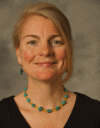Description
One enduring challenge in the US system of education has been to prepare youth with disabilities for life beyond the classroom. While research and practice in transition education has made great strides in improving postsecondary outcomes for youth with disabilities, we still struggle to address the needs of youth with disabilities who are also from historically marginalized groups. Research demonstrates that cultural and social capital are important levers in both transition education and the pursuit of equity across diverse groups of people. In this presentation, specific types of cultural and social capital relevant to special education are identified. Next, their potential to impact positive postschool outcomes is explained. Finally, the implications for research and practice that take into consideration culture and diversity as complex, interactional variables are discussed.
Presenter
 Dr. Audrey Trainor, Associate Professor in the Department of Special Education at the University of Wisconsin-Madison, has developed research and practice expertise in the area of transition for youth with high incidence disabilities and issues of equity and diversity in special education. Her research trajectory includes a balance of both qualitative and quantitative research methods. A central focus of Dr. Trainor's work has been research addressing the ongoing need for improved transition services and postschool outcomes for youth with high incidence disabilities who are also youth of color, learning English as a second language, and/or living in poverty. In addition to recent journal articles on capital theory in special education, Dr. Trainor is a co-editor of Reviewing Qualitative Research in the Social Sciences currently in press at Routledge. She regularly teaches graduate seminars in research design in special education and a course for preservice teachers in classroom and behavior management. Dr. Trainor is the 2012-13 president of the Division on Career Development and Transition of the Council for Exceptional Children. Prior to her career in postsecondary education, she was a special education high school teacher working with students with high incidence disabilities for nearly a decade.
Dr. Audrey Trainor, Associate Professor in the Department of Special Education at the University of Wisconsin-Madison, has developed research and practice expertise in the area of transition for youth with high incidence disabilities and issues of equity and diversity in special education. Her research trajectory includes a balance of both qualitative and quantitative research methods. A central focus of Dr. Trainor's work has been research addressing the ongoing need for improved transition services and postschool outcomes for youth with high incidence disabilities who are also youth of color, learning English as a second language, and/or living in poverty. In addition to recent journal articles on capital theory in special education, Dr. Trainor is a co-editor of Reviewing Qualitative Research in the Social Sciences currently in press at Routledge. She regularly teaches graduate seminars in research design in special education and a course for preservice teachers in classroom and behavior management. Dr. Trainor is the 2012-13 president of the Division on Career Development and Transition of the Council for Exceptional Children. Prior to her career in postsecondary education, she was a special education high school teacher working with students with high incidence disabilities for nearly a decade.
Moderator
Barbara Wheeler, Ph.D., Associate Director, USC University Center for Excellence in Developmental Disabilities, Childrens Hospital Los Angeles and AUCD Multicultural Council Chair.
Topics:
Long-term Services and Supports
,
Transition
,
University Centers for Excellence in Developmental Disabilities (UCEDD)




 Dr. Audrey Trainor, Associate Professor in the Department of Special Education at the University of Wisconsin-Madison, has developed research and practice expertise in the area of transition for youth with high incidence disabilities and issues of equity and diversity in special education. Her research trajectory includes a balance of both qualitative and quantitative research methods. A central focus of Dr. Trainor's work has been research addressing the ongoing need for improved transition services and postschool outcomes for youth with high incidence disabilities who are also youth of color, learning English as a second language, and/or living in poverty. In addition to recent journal articles on capital theory in special education, Dr. Trainor is a co-editor of Reviewing Qualitative Research in the Social Sciences currently in press at Routledge. She regularly teaches graduate seminars in research design in special education and a course for preservice teachers in classroom and behavior management. Dr. Trainor is the 2012-13 president of the Division on Career Development and Transition of the Council for Exceptional Children. Prior to her career in postsecondary education, she was a special education high school teacher working with students with high incidence disabilities for nearly a decade.
Dr. Audrey Trainor, Associate Professor in the Department of Special Education at the University of Wisconsin-Madison, has developed research and practice expertise in the area of transition for youth with high incidence disabilities and issues of equity and diversity in special education. Her research trajectory includes a balance of both qualitative and quantitative research methods. A central focus of Dr. Trainor's work has been research addressing the ongoing need for improved transition services and postschool outcomes for youth with high incidence disabilities who are also youth of color, learning English as a second language, and/or living in poverty. In addition to recent journal articles on capital theory in special education, Dr. Trainor is a co-editor of Reviewing Qualitative Research in the Social Sciences currently in press at Routledge. She regularly teaches graduate seminars in research design in special education and a course for preservice teachers in classroom and behavior management. Dr. Trainor is the 2012-13 president of the Division on Career Development and Transition of the Council for Exceptional Children. Prior to her career in postsecondary education, she was a special education high school teacher working with students with high incidence disabilities for nearly a decade.




